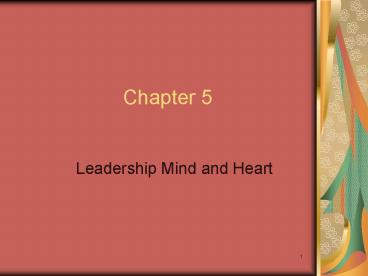Leadership Mind and Heart - PowerPoint PPT Presentation
1 / 12
Title:
Leadership Mind and Heart
Description:
1. Chapter 5. Leadership Mind and Heart. 2. Chapter Objectives ... patterns and open your mind to new ideas and multiple ... Leader's Mind. Independent thinking ... – PowerPoint PPT presentation
Number of Views:105
Avg rating:3.0/5.0
Title: Leadership Mind and Heart
1
Chapter 5
- Leadership Mind and Heart
2
Chapter Objectives
- Recognize how mental models guide your behavior
and relationships. - Engage in independent thinking by staying
mentally alert, thinking critically, and being
mindful rather than mindless. - Breaking out of categorized thinking patterns and
open your mind to new ideas and multiple
perspectives. - Begin to apply systems thinking and personal
mastery to your activities at school or work.
3
Chapter Objectives (contd.)
- Exercise emotional intelligence, including being
self-aware, managing your emotions, motivating
yourself, displaying empathy, and managing
relationships. - Apply the difference between motivating others
based on fear and motivating others based on love.
4
Mental Models
Theories people hold about specific systems in
the world and their expected behavior
5
Ex. 5.2 The Perception Process
Organizing selected data into patterns for
interpretation and response
Screening and selecting stimuli to process further
Observation via the senses
Environmental stimuli
6
Stereotyping
The tendency to assign a person to a group or
broad category and then to attribute widely held
generalizations about the group to the individual
7
Leaders Mind
- Independent thinking
- Questioning assumptions and interpreting data and
events according to ones own beliefs, ideas, and
thinking, rather than pre-established rules or
categories defined by others - Mindfulness
- The process of continuously reevaluating
previously learned ways of doing things in the
context of evolving information and shifting
circumstances
8
Systems Thinking
The ability to see the synergy of the whole
rather than just the separate elements of a
system and to learn to reinforce or change whole
system patterns
9
Emotional Intelligence
A persons abilities to perceive, identify,
understand, and successfully manage emotions in
self and others
10
Ex. 5.5 Eight Families of Emotions
Enjoyment
Anger
Fear
Love
Surprise
Disgust
Shame
Sadness
11
Ex. 5.6 The Components of Emotional Intelligence
Self-Awareness
Social Awareness
- Emotional self awareness
- Accurate self-assessment
- Self-confidence
- Empathy
- Organizational awareness
- Service orientation
Self-Management
Relationship Management
- Emotional self-control
- Trustworthiness
- Conscientiousness
- Adaptability
- Optimism
- Achievement-orientation
- Initiative
- Development of others
- Inspirational leadership
- Influence
- Communication
- Change catalyst
- Conflict management
- Bond building
- Teamwork and collaboration
12
Types of Motivation
- Fear-based Motivation
- Motivation based on fear of losing a job
- Love-based Motivation
- Motivation based on feeling valued in the job































